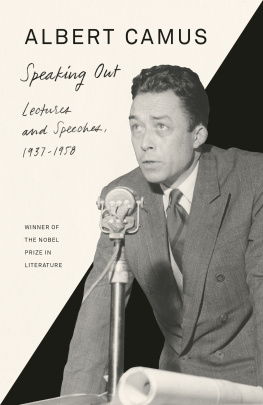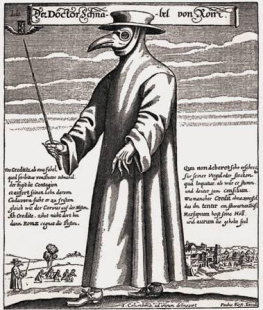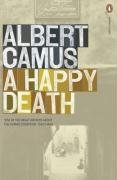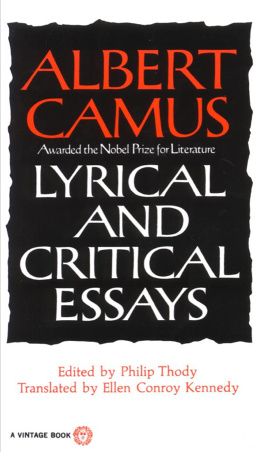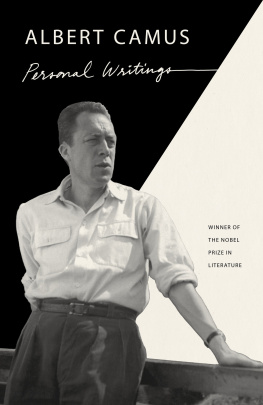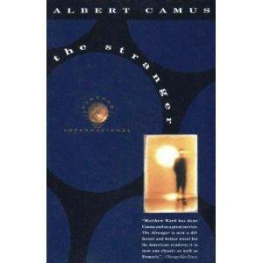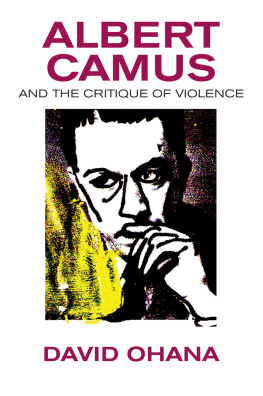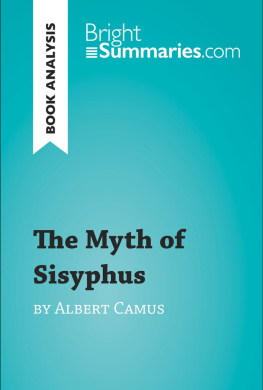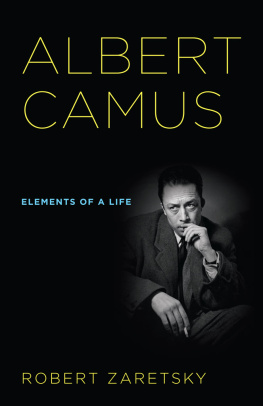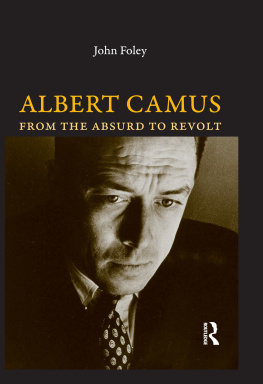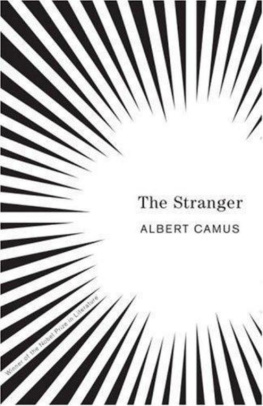Albert Camus - The Myth of Sisyphus: And Other Essays
Here you can read online Albert Camus - The Myth of Sisyphus: And Other Essays full text of the book (entire story) in english for free. Download pdf and epub, get meaning, cover and reviews about this ebook. year: 1991, publisher: Vintage, genre: Science. Description of the work, (preface) as well as reviews are available. Best literature library LitArk.com created for fans of good reading and offers a wide selection of genres:
Romance novel
Science fiction
Adventure
Detective
Science
History
Home and family
Prose
Art
Politics
Computer
Non-fiction
Religion
Business
Children
Humor
Choose a favorite category and find really read worthwhile books. Enjoy immersion in the world of imagination, feel the emotions of the characters or learn something new for yourself, make an fascinating discovery.

- Book:The Myth of Sisyphus: And Other Essays
- Author:
- Publisher:Vintage
- Genre:
- Year:1991
- Rating:4 / 5
- Favourites:Add to favourites
- Your mark:
- 80
- 1
- 2
- 3
- 4
- 5
The Myth of Sisyphus: And Other Essays: summary, description and annotation
We offer to read an annotation, description, summary or preface (depends on what the author of the book "The Myth of Sisyphus: And Other Essays" wrote himself). If you haven't found the necessary information about the book — write in the comments, we will try to find it.
The Myth of Sisyphus: And Other Essays — read online for free the complete book (whole text) full work
Below is the text of the book, divided by pages. System saving the place of the last page read, allows you to conveniently read the book "The Myth of Sisyphus: And Other Essays" online for free, without having to search again every time where you left off. Put a bookmark, and you can go to the page where you finished reading at any time.
Font size:
Interval:
Bookmark:
[1]
From the point of view of the relative value of truth. On the other hand, from the point of view of virile behavior, this scholars fragility may well make us smile.
[2]
Let us not miss this opportunity to point out the relative character of this essay. Suicide may indeed be related to much more honorable considerationsfor example, the political suicides of protest, as they were called, during the Chinese revolution.
[3]
I have heard of an emulator of Peregrinos, a post-war writer who, after having finished his first hook, committed suicide to attract attention to his work. Attention was in fact attracted, but the book was judged no good.
[4]
But not in the proper sense. This is not a definition, but rather an enumeration of the feelings that may admit of the absurd. Still, the enumeration finished, the absurd has nevertheless not been exhausted.
[5]
Apropos of the notion of exception particularly and against Aristotle.
[6]
It may be thought that I am neglecting here the essential problem, that of faith. But I am not examining the philosophy of Kierkegaard or of Chestov or, later on, of Husserl (this would call for a different place and a different attitude of mind); I am simply borrowing a theme from them and examining whether its consequences can fit the already established rules. It is merely a matter of persistence.
[7]
I did not say excludes God, which would still amount to asserting.
[8]
Let me assert again: it is not the affirmation of God that is questioned here, but rather the logic leading to that affirmation.
[9]
Even the most rigorous epistemologies imply metaphysics. And to such a degree that the metaphysic of many contemporary thinkers consists in having nothing but an epistemology.
[10]
A.At that time reason had to adapt itself or die. It adapts itself. With Plotinus, after being logical it becomes aesthetic. Metaphor takes the place of the syllogism.
B.Moreover, this is not Plotinus only contribution to phenomenology. This whole attitude is already contained in the concept so dear to the Alexandrian thinker that there is not only an idea of man but also an idea of Socrates.
[11]
I am concerned here with a factual comparison, not with an apology of humility. The absurd man is the contrary of the reconciled man.
[12]
Quantity sometimes constitutes quality. If I can believe the latest restatements of scientific theory, all matter is constituted by centers of energy. Their greater or lesser quantity makes its specificity more or less remarkable. A billion ions and one ion differ not only in quantity but also in quality. It is easy to find an analogy in human experience.
[13]
Same reflection on a notion as different as the idea of eternal nothingness. It neither adds anything to nor subtracts anything from reality. In psychological experience of nothingness, it is by the consideration of what will happen in two thousand years that our own nothingness truly takes on meaning. In one of its aspects, eternal nothingness is made up precisely of the sum of lives to come which will not be ours.
[14]
The will is only the agent here: it tends to maintain consciousness. It provides a discipline of life, and that is appreciable.
[15]
What matters is coherence. We start out here from acceptance of the world. But Oriental thought teaches that one can indulge in the same effort of logic by choosing against the world. That is just as legitimate and gives this essay its perspectives and its limits. But when the negation of the world is pursued just as rigorously, one often achieves ( in certain Vedantic schools) similar results regarding, for instance, the indifference of works. In a book of great importance, Le Choix, Jean Grenier establishes in this way a veritable philosophy of indifference.
[16]
In the fullest sense and with his faults. A healthy attitude also includes faults.
[17]
At this point I am thinking of Molieres Alceste. Everything is so simple, so obvious and so coarse. Alceste against Philinte.
[18]
It is curious to note that the most intellectual kind of painting, the one that tries to reduce reality to its essential elements, is ultimately but a visual delight. All it has kept of the world is its color. (This is apparent particularly in Leger.)
[19]
If you stop to think of it, this explains the worst novels. Almost everybody considers himself capable of thinking and, to a certain degree, whether right or wrong, really does think. Very few, on the contrary, can fancy themselves poets or artists in words. But from the moment when thought won out over style, the mob invaded the novel. That is not such a great evil as is said. The best are led to make greater demands upon themselves. As for those who succumb, they did not deserve to survive.
[20]
Malrauxs work, for instance. But it would have been necessary to deal at the same time with the social question which in fact cannot be avoided by absurd thought (even though that thought may put forward several solutions, very different from one another). One must, however, limit oneself.
[21]
Stavrogin: Do you believe in eternal life in the other world? Kirilov: No, but in eternal life in this world.
[22]
Man simply invented God in order not to kill himself. That is the summary of universal history down to this moment.
[23]
Boris de Schloezer.
[24]
Gides curious and penetrating remark: almost all Dostoevskys heroes are polygamous.
[25]
Melvilles Moby Dick, for instance.
[26]
It is worth noting that the works of Kafka can quite as legitimately be interpreted in the sense of a social criticism (for instance in The Trial). It is probable, moreover, that there is no need to choose. Both interpretations are good. In absurd terms, as we have seen, revolt against men is also directed against God: great revolutions are always metaphysical.
[27]
In The Castle it seems that distractions in the Pascalian sense are represented by the assistants who distract K. from his anxiety. If Frieda eventually becomes the mistress of one of the assistants, this is because she prefers the stage setting to truth, everyday life to shared anguish.
[28]
This is obviously true only of the unfinished version of The Castle that Kafka left us. But it is doubtful that the writer would have destroyed in the last chapters his novels unity of tone.
[29]
Purity of heart.
[30]
The only character without hope in The Castle is Amalia. She is the one with whom the Land Surveyor is most violently contrasted.
[31]
On the two aspects of Kafkas thought, compare In the Penal Colony, published by the Cahiers du Sud (and in America by Partisan Review translators note): Guilt [of man is understood] is never doubtful and a fragment of The Castle (Momuss report): The guilt of the Land Surveyor K. is hard to establish.
[32]
What is offered above is obviously an interpretation of Kafkas work. But it is only fair to add that nothing prevents its being considered, aside from any interpretation, from a purely aesthetic point of view. For instance, B. Groethuysen in his remarkable preface to The Trial limits himself, more wisely than we, to following merely the painful fancies of what he calls, most strikingly, a daydreamer. It is the fate and perhaps the greatness of that work that it offers everything and confirms nothing.
[33]
May I take the ridiculous position of saying that I do not like the way Gide exalts the body? He asks it to restrain its desire to make it keener. Thus he comes dangerously near to those who in brothel slang are called involved or brain-workers. Christianity also wants to suspend desire. But, more natural, it sees a mortification in this. My friend Vincent, who is a cooper and junior breast-stroke champion, has an even clearer view. He drinks when he is thirsty, if he desires a woman tries to go to bed with her, and would marry her if he loved her (this hasnt yet happened). Afterward he always says: I feel betterand this sums up vigorously any apology that might be made for satiety.
Font size:
Interval:
Bookmark:
Similar books «The Myth of Sisyphus: And Other Essays»
Look at similar books to The Myth of Sisyphus: And Other Essays. We have selected literature similar in name and meaning in the hope of providing readers with more options to find new, interesting, not yet read works.
Discussion, reviews of the book The Myth of Sisyphus: And Other Essays and just readers' own opinions. Leave your comments, write what you think about the work, its meaning or the main characters. Specify what exactly you liked and what you didn't like, and why you think so.

